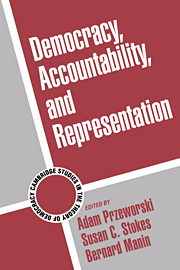Book contents
- Frontmatter
- Contents
- List of Contributors
- Introduction
- Part One Elections, Accountability, and Representation
- Part Two The Structure of Government and Accountability
- 8 Accountability in Athenian Politics
- 9 Government Accountability in Parliamentary Democracy
- 10 Mixing Elected and Nonelected Officials in Democratic Policy Making: Fundamentals of Accountability and Responsibility
- Part Three Overview
- Author Index
- Subject Index
8 - Accountability in Athenian Politics
Published online by Cambridge University Press: 05 June 2012
- Frontmatter
- Contents
- List of Contributors
- Introduction
- Part One Elections, Accountability, and Representation
- Part Two The Structure of Government and Accountability
- 8 Accountability in Athenian Politics
- 9 Government Accountability in Parliamentary Democracy
- 10 Mixing Elected and Nonelected Officials in Democratic Policy Making: Fundamentals of Accountability and Responsibility
- Part Three Overview
- Author Index
- Subject Index
Summary
Other chapters in this volume discuss accountability in modern democracies. As a background to these analyses, this chapter offers an account on accountability mechanisms in the first democracy – Athens in the fifth and fourth centuries B.C. Athenian democracy, all things considered, must be considered a great success largely because of its elaborate system of checks and balances, which prevented rash decisions by the citizens and abuse of power by military and political leaders. In this system, mechanisms of accountability had a central place.
As a direct democracy, the Athenian political system was much simpler than modern representative democracies. In the latter, accountability can be discussed in terms of a threefold principal-agent relationship (see also the Introduction to the present volume). First, the people as a principal choose political representatives as their agents. Second, in parliamentary systems the legislature chooses the executive as its agent. Third, the executive appoints a bureaucracy of officials as its agents. In Athens, these three relationships collapsed into one. Political leaders (orators in the Assembly) and officials (notably generals) were directly accountable to the citizens at large.
Accountability is an ex post mechanism of control. In modern democracies, control is also exercised ex ante. Voters elect politicians, the legislature nominates the government, and the government appoints officials. In Athens, there was less scope for control ex ante. Each year, some twelve hundred officials were chosen, including the members of the Council of the Five Hundred who prepared cases for the Assembly. Of these, about one hundred were chosen in direct elections, notably holders of all military commands and of the most important financial offices.
- Type
- Chapter
- Information
- Democracy, Accountability, and Representation , pp. 253 - 278Publisher: Cambridge University PressPrint publication year: 1999
- 17
- Cited by



